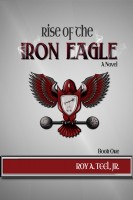Edition: Narroway Press, 2014
Review number: 1487
Rise of the Iron Eagle is a thriller, first in a series, about vigilantism and serial killers. I was warned before I started it that was not for the faint-hearted, and it certainly is that. There are frequent scenes not for the squeamish, and, though I don't really mind that usually, there are lengthy descriptions of torture which I did find disturbing - sometimes gratuitously over the top. More on that later...
The first chapter introduces a character who initially appears to be going to be the the novel's principal viewpoint character, a retired alcoholic private detective, whose granddaughter is the latest victim of the Iron Eagle killer - only for him to be kidnapped and killed himself. This is an interesting opening, to say the least. But after this promising start, the story settles down into a more straightforward tale of the FBI hunt for the vigilante who targets serial killers.
Vigilantism is a popular theme in fiction, presumably because it plays into people's fantasies of besting those who have done them a perceived injustice. Few actually have the abilities needed to be a successful vigilante, of the solitary Iron Eagle type, anyway - able to find criminals as yet unknown to law enforcement, able to overpower and murder successful killers, and able to do this while taunting the FBI and remaining uncaught - like a rather dark comic book superhero. This is rather different from the types of vigilantism which seem to happen in the real world, which would include harassment of suspected paedophiles by groups of concerned citizens. The tragedy of vigilantism is of course the possibility of targeting someone innocent, either through mistaken identity or an incorrect assumption that the person attacked is indeed guilty of the offence. Of course, the police are not immune from this issue, as the Guildford Four would attest, but by carrying out their investigations in a system where there should be checks and balances, and where judicial punishment is separate from the search for the culprit, this is less likely to happen and more easily correctable. (I am not sure that the Guildford Four would agree with this sentence, but if they had been murdered by the police when they had become convinced of their guilt, they could not have been exonerated even 15 or more years later.) So there are two reasons not to go outside the system - you might be wrong, and you might not be good enough at it to survive attacking a murderer and getting away with it.
Rise of the Iron Eagle plays lip service to this, but I couldn't help but have the sneaking suspicion that the Iron Eagle was the real hero of the book, at least most of the way through. This included the feeling that I was meant to approve of the unpleasant torture the vigilante visited on his victims, in the name of retribution and obtaining a full confession, Confessions made under torture and undue pressure are, it should be noted, notoriously unreliable (see the Guildford Four again). This particular issue was not addressed at all; all the characters, law enforcement included, seemed to take the validity of the confessions as unquestionable. (The reader knows that they were accurate, because of other things mentioned which are not known to the police.) More moral ambiguity would have improved the literary quality of this thriller, as well as providing darkness which is not just derived from the extreme violence: this is why The Dark Knight Returns and The Watchmen were so much greater than the comic books around them when they appeared in the eighties. I was, to be honest, expecting this novel to be dark in a similar way to those comic books - morally ambiguous, gothic tales which have a serious point to make.
I have never watched the TV series Dexter, nor have I read any of the books. But the theme here of a serial killer who preys on serial killers is familiar from it even so, and I suspect there would be more similarities which I would notice if I was familiar with the series. There are points of some interest, and many readers of this type of fiction might enjoy it. But overall, I felt that Rise of the Iron Eagle was not to my taste, especially the way that the idea of vigilantism is treated. The tone of the violent scenes put me off, though they are clearly well written (there are a large number of different ways in which "x did something unpleasant to y and caused y a lot of pain" is expressed). Because of my personal dislike of the treatment, I feel I can only rate the novel at 5/10.
Subscribe to:
Post Comments (Atom)




No comments:
Post a Comment